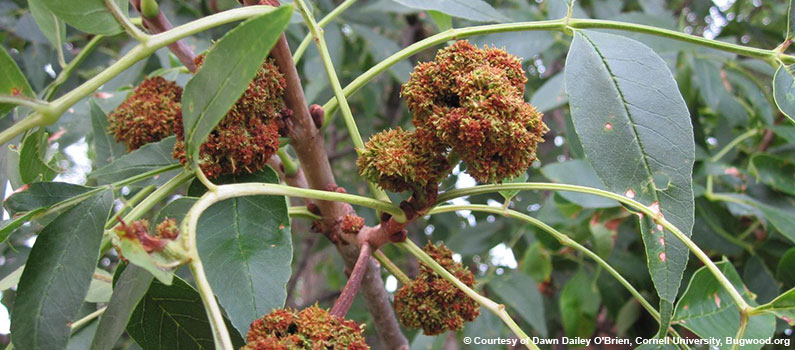Understanding the Ash Flower Gall Mite
The Ash Flower Gall Mite is a tiny pest that targets ash trees, creating distinctive and often unsightly galls in male flower clusters. Scientifically known as eriophyid mites, these insects measure less than 1 mm in length and range in color from yellowish and greenish to reddish and red. Each mite species produces its own characteristic gall, with ash flower gall mites causing particularly visible damage.
Under favorable conditions, ash flower gall mites can go from egg to adult in just 10 to 14 days. This rapid life cycle means multiple generations can develop over a single growing season, increasing the chance of significant infestation if left untreated. For details on how Eden Tree Pros can help, visit pest and disease treatments.
Ash Flower Gall Mite Life Cycle and Damage
Ash flower gall mites feed on male flower clusters, causing them to become irregularly branched and fringed. Initially, the affected clusters appear green, but as they dry out, they turn black. These galls often persist on the tree until the following spring, giving the tree a rough and disheveled appearance. Fortunately, while the galls are visually unpleasant, they do not impact the overall vigor or health of the tree.
However, consistent infestations can be a sign of a broader pest management issue. While the damage may not harm the tree’s life span directly, it can impact the tree’s aesthetic and perceived health, especially in residential or commercial landscapes. To better understand these implications, you can refer to resources such as the University of Minnesota Extension.
How Eden Tree Pros Can Help with Ash Flower Gall Mites
At Eden Tree Pros, we provide professional evaluations and tailored treatments to reduce populations of ash flower gall mites and maintain tree health. Our team uses science-based methods to monitor mite activity and implement control strategies during optimal treatment windows. These proactive services help mitigate visible damage and keep your ash trees in peak condition.
If you notice unusual growths or blackened clusters on your ash tree flowers, don’t wait for the next season. Our certified arborists can help identify the issue and advise on the best course of action. Contact us today to schedule a consultation and protect your trees from further stress.

